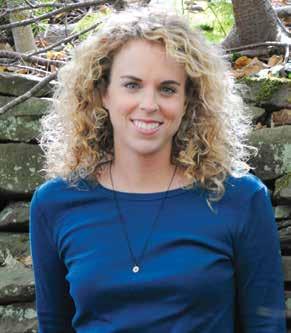
4 minute read
The Nature of Naturopathic Medicine
BY DR. AMY PUNKÉ
Dr. Amy Punké is a member in good standing with the Nova Scotia Association of Naturopathic Doctors (NSAND) and the Canadian Association of Naturopathic Doctors (CAND). Licensed with the College of Naturopathic Doctors of Alberta (CNDA). P reparing this article has been somewhat therapeutic for me. Like many of you, I am sharing in the different themes created by this time of pandemic. I have experienced moments of grief, loss, fear, helplessness, worry and anger.
In a way, we are all going through the stages of grief that are often identified as denial, anger, bargaining, depression and acceptance. The five stages of grief that were first proposed by Elisabeth KüblerRoss in her 1969 book, On Death and Dying are a part of a framework that helps those learning to live with the loss of a loved one. But as we have seen with the lock-down and the massive change in the world as we know it, many of us are experiencing a sense of loss on many different levels; a loss of community and connection, financial loss, a loss of the arts and culture, a loss of family and support, loss of government resources and aid and, the list goes on.
While the phrases, “We are all in the same boat” and, “We are all in this together,” have become popular when trying to comfort each other -- in reality, this could not be farther from the truth.
I am reminded of a short poem by Damian Barr, columnist and author of You Will Be Safe that went viral on Twitter back in April. His words resonated with many and became a beacon of hope for mental health awareness around the world, “We are not all in the same boat. We are all in the same storm. Some are on super-yachts. Some have just the one oar.”
Indeed, “Issues of health disparities have been present for decades, but the pandemic has placed a magnifying glass on them,” explains Mary Brucker, PhD. In her article In the Same Storm but Different Boats Dr. Brucker reports, “During the pandemic, there has been a disproportionate burden of illness and death among racial and ethnic minority groups. The colour of skin does not mean a genetic difference but, rather, is a surrogate for issues of social determinants of health.”
Cynthia Manley is a Counselling Therapist for children and runs a private practice in downtown New Glasgow. The biggest challenges her clients and families are facing due to the pandemic has been an overwhelming sense of isolation, sense of loss, fear and frustration.
“Parents/guardians are struggling with keeping up routines and having to be so many things to their children: teacher, summer camp counsellor, mental health counsellor, and so on,” Cynthia explains. “Since school finished in June, those pressures have lessened a little, but there is still a lack of adult time and opportunities to take a break. There has been so much uncertainty around the coming school year and that is hard on parents as well.”
Hannah MacNeil works with Early Childhood Intervention in Pictou County and is a mother of two young adolescent boys. She has seen a lot more stress and anxiety both with the families she works with and with her own children. She stresses the importance of communicating with your children. “My son does not like to talk about his anxiety,” Hannah explains, “But we found it helpful if we played cards or a board game while asking him some questions. This helped take away some of the stress and he was more talkative.”
“Children also need to feel heard and know that their feelings are understandable,” adds Cynthia Manley. “Sometimes it’s more helpful to listen to children, name the feelings you hear them expressing, and tell them that these feelings are normal and make sense.” We, as adults need to listen to our own feelings, too. Try to be gentle and compassionate with yourself, and honour how you are feeling and take time to grieve the losses you have experienced. Avoid social media (or set a time limit) and watch for mindless scrolling online that may lead to feelings of comparison and judgment. “We know children do well with structure (e.g., routine meals and a set bedtime), and so do the adults,” says Hannah MacNeil. “Your children will mimic you and how you handle your stress. Setting small goals and some self-care can have a huge impact for your health and the entire household.” Most importantly, know you are not alone. While many of us have been enjoying the changes due to the pandemic – perhaps more downtime time with their family and loved ones – others have not. Some may feel like their boat is sinking, and they can barely stay afloat.
Here are some important resources:
Provincial Mental Health Crisis and Addictions Crisis Line 1-888-429-8167
NSHA Mental Health and Addiction services https://mha.nshealth.ca/en/coronavirus
As many of us have begun the ‘acceptance’ stage of the pandemic, learning to adapt to the new normal, many individuals are still in survival mode. As Damien Barr’s poem concludes so eloquently, “So, friends, we are not in the same boat. We are going through a time when our perceptions and needs are completely different. And each one will emerge, in his own way, from that storm.”
— Damian Barr








